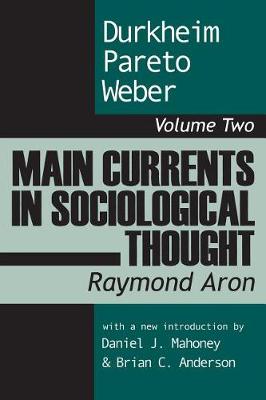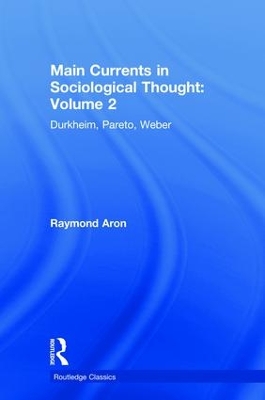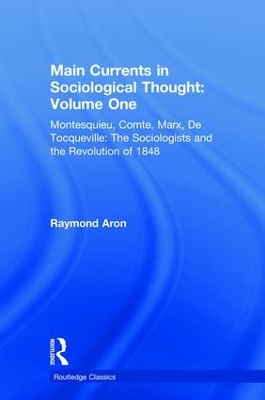Routledge Classics
3 total works
In this second volume of Main Currents of Sociological Thought, Raymond Aron continues the analysis, begun in the first volume, of the "great doctrines of historical sociol-ogy." Aron explores the work of three figures who profoundly shaped sociology as it entered the twentieth century: Emile Durkheim, the great French theorist of consensus, who continued Auguste Comte's quest for a science of society and a scientific validation of morality; Vilfredo Pareto, the Italian "neo-Machiavellian" who mocked traditional mo-rality and humanitarian pretensions and emphasized the oligarchic or elitist character of all societies; and the German sociologist Max Weber, who reflected continuously on the relationship between science and action, filled with deep foreboding about the pros-pects for human freedom in an age marked by bureaucratization and rationalization.
Aron presents rich portraits of these three thinkers, drawing from them what remains of enduring worth, even as he distances himself from Durkheim's project for a science of society, Pareto's exaggerated critique of humanitarianism, and Weber's tragic pessimism. Aron's book is essential for clarifying his profound indebtedness to and crucial divergences from the thought of Max Weber, the sociologist par excellence, in Aron's view.
Together with volume 1, which treats the work of Montesquieu, Comte, Marx, and Tocqueville, it forms the definitive survey of the great social thinkers to date. Yet, as Daniel J. Mahoney and Brian C. Anderson explain in their introduction, Main Currents is more than a survey; it is above all a challenge to contemporary social science to retain the ambition of an older, philosophically informed sociology to present an interpretation of modern society and to reflect on the meaning of universal history.
This is the second of Raymond Aron's classic two-volume survey of the sociological tradition – arguably the definitive work of its kind. Aron explores the work of three figures who profoundly shaped sociology as it entered the twentieth century: Émile Durkheim, who continued Auguste Comte's quest for a science of society and a scientific validation of morality; Vilfredo Pareto, the Italian "neo-Machiavellian" who emphasized the oligarchic or elitist character of all societies; and the German sociologist Max Weber, who reflected critically on the prospects for human freedom in an age marked by bureaucratization and rationalization.
Aron presents rich portraits of these three thinkers, drawing out the enduring insights that remain in their work. At the same time he reflects critically on Durkheim's project for a science of society, Pareto's critique of humanitarianism, and Weber's tragic pessimism. Above all the book is remarkable for demonstrating Aron’s lifelong indebtedness to and divergence from the thought of Max Weber, the sociologist par excellence, in Aron's view.
This Routledge Classics edition includes an introduction by Daniel J. Mahoney and Brian C. Anderson.
This is the first part of Raymond Aron's landmark two-volume study of the sociological tradition—arguably the definitive work of its kind. More than a work of reconstruction, Aron's study is, at its deepest level, an engagement with the very question of modernity: how did the intellectual currents which emerged in the eighteenth century shape the modern political and philosophical order? With scrupulous fairness, Aron examines the thoughts and arguments of the major social thinkers to discern how they answered this question.
Volume One explores three traditions: the French liberal school of political sociology, represented by Montesquieu and Tocqueville; the Comtean tradition, anticipating Durkheim in its elevation of social unity and consensus; and the Marxists, who posited the struggle between classes and placed their faith in historical necessity. In his customary clear and penetrating prose, Aron argues that each of these schools offers its own theory of the diversity of societies and that "each is inspired both by moral convictions and by scientific hypotheses."
This Routledge Classics edition includes an introduction by Daniel J. Mahoney and Brian C. Anderson.


